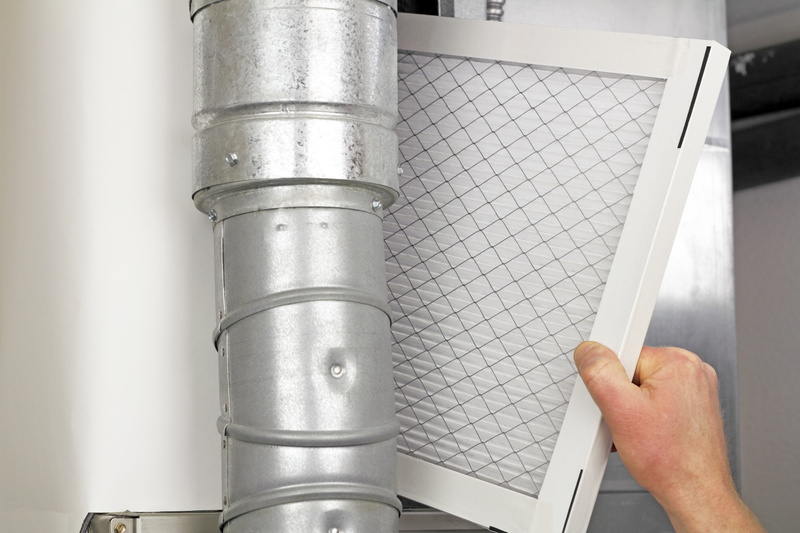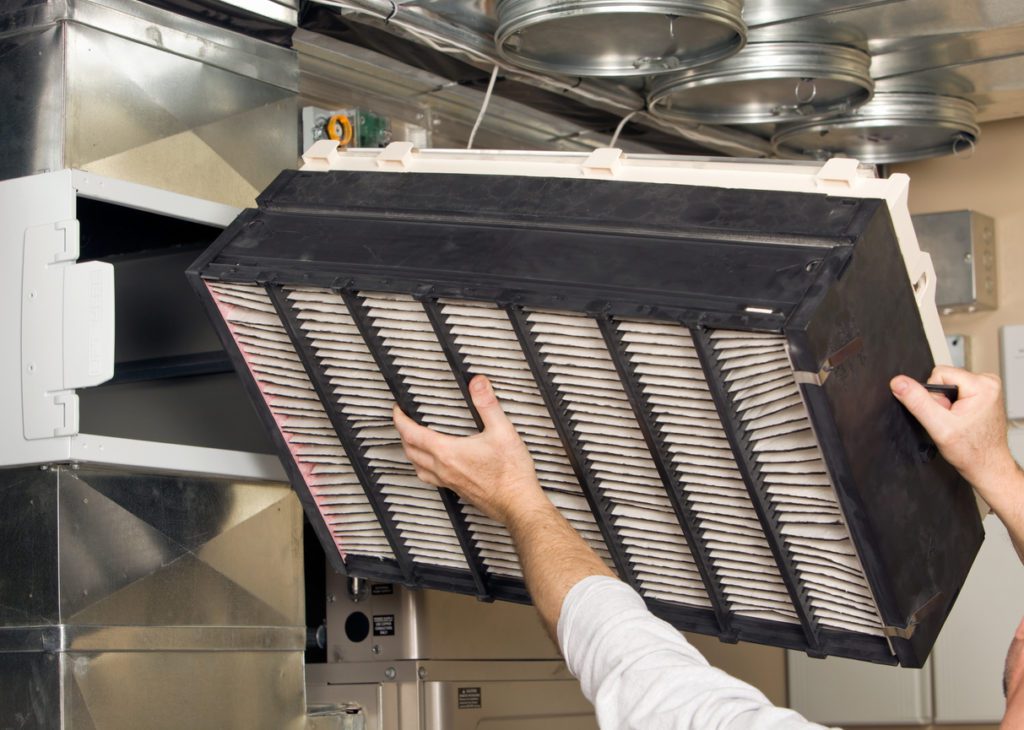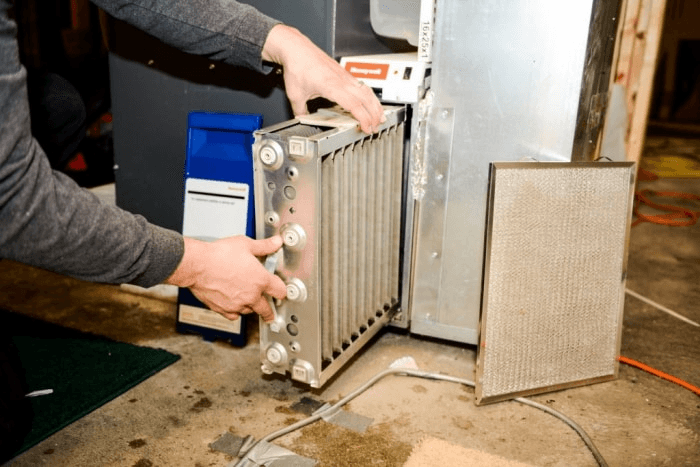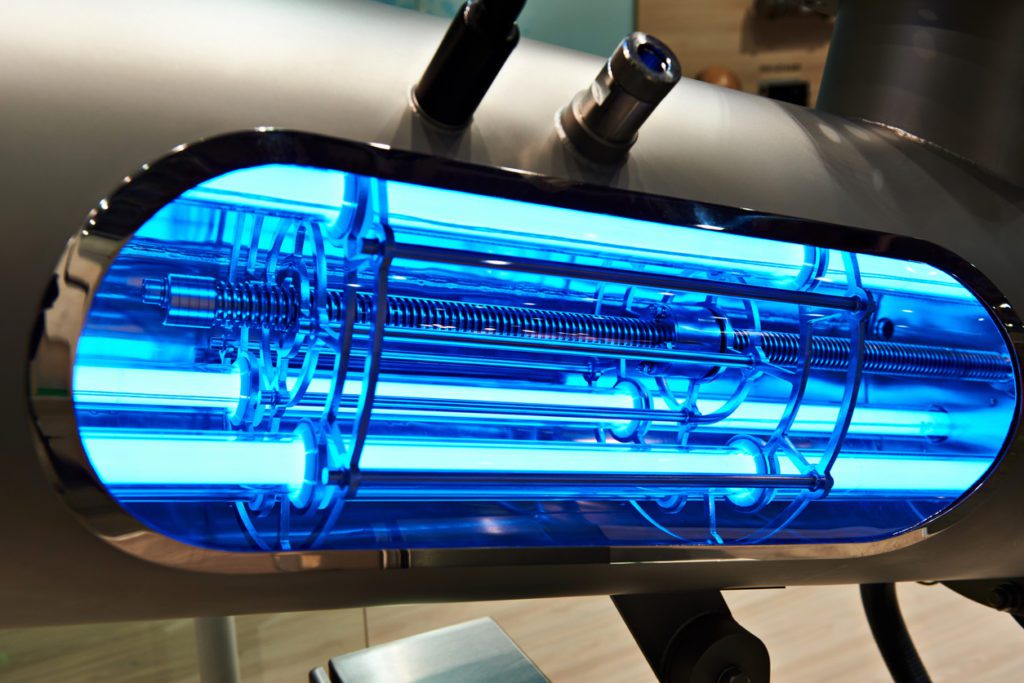Believe it or not, when it comes to air pollution, the air that you breathe inside your house is likely more polluted than the outside air. While modern homes are more secure and safe from the harsh conditions of the great outdoors, this, unfortunately, means that they also trap contaminants inside.
The dust you may notice accumulating on various surfaces in your home is only the beginning; it represents a tiny portion of what may be circulating in the air. Everyday air that you and your family breathe may contain an undetectable mixture of dust mites, pollen, dander, and other contaminants. Yikes!
So, what can you do to combat these allergens at home? That’s where a whole-home air filter saves the day!
Our air quality pros at Best Home Services explain the types of whole-home air filters and their benefits.
How Do Whole House Air Filters Work?
Generally, household air filters are available in two basic types: media filters and electronic filters.
- Media filters: Create a physical barrier to trap tiny allergens and contaminants
- Electronic filters: Use a high voltage charge to attract and capture particles.
Air filters are either built into your HVAC system or are freestanding units that can be placed in individual rooms throughout your home.
Types of Whole House Air Filters
Whole house filters must be professionally installed in the return-air ductwork of your HVAC system in order to trap particles and contaminants as the air passes through.
These systems are called passive filtering systems because as long as the fan is running, they will filter the air in your home.
There are four main types of whole-house filters:

Flat Filters
If you have a forced-air system, you have a primitive air-filtration system in place. Do you know that air filter that should be changed at least every 30-60 days? That’s the first line of defense that your HVAC system has against allergens.
When this filter gets clogged with dust and debris, it may cause your system to shut off completely as it isn’t getting proper airflow. While these filters can catch large particles of dust and other debris, they are unable to block microscopic contaminants that are most irritating to those who suffer from allergies.
Pleated filters cost a little more and will do a slightly better job at catching particles. Higher-rated pleated filters are also electrostatically charged to attract pesky containments like pet dander and pollen. These $15 filters should be changed every 60-90 days.

Extended Media Filters
An extended media filter is a boxy unit that contains an accordion-like structure of filtration media, making it much more effective at removing particles than regular thin fiberglass filters.
These kinds of filters require professional installation because the container holding the filtration material must be installed into the ductwork of your HVAC system. Extended media filters are slightly more costly, running $400 to $600 for installation and $40 to $60 for filter replacements, which should be changed at least once a year.

Electronic Filters
Electronic air filters, sometimes called electrostatic precipitators, are high-tech units. Like extended media filters, they will also need to be installed in your HVAC ductwork.
A high-voltage current charges the pollutants as the air flows through the filter. Collector plates at the other end of the device that have the opposite charge attract the particles like a magnet.
Electronic filters work especially well on tiny particles that are too small to be trapped in media filters, such as smoke particles. Although the initial cost is higher, ranging from $600 to $1000 electronic filters never need to be replaced, unlike media air filters. However, keep in mind that they do require a little maintenance, as the collector plates need to be cleaned every few months with soapy water.
Electronic filters remove contaminants with a high-voltage current that charges unwanted particles and pulls them from the air like a magnet.

Ultraviolet Filters
If you are worried about germs and other microbes, an ultraviolet (UV) air filter has many benefits. UV filters are typically integrated into HVAC systems where they employ UV light to destroy airborne viruses and bacteria.
One major benefit of installing a UV air filter is that it can increase your HVAC system’s efficiency by helping to eliminate microbial buildup in your system that can impede airflow.
Are you ready to install a UV air filter in your Southwest Florida home? Our indoor air quality technicians at Best Home Services are ready to ensure that your indoor air is purified and safe for you and your family! Call us today for an air quality assessment; 844-921-2833!
Benefits of Whole Home Filters
As experts in air quality, we believe that installing a UV air filtration system and other types of whole home air filters can only improve the air quality in your home, not make it worse.
Depending on which whole-home air filter that you choose, they can:
- Reduce the risks of airborne illnesses
- Relieve allergy symptoms
- Lengthen your HVAC system’s lifespan
- Foster a cleaner, better smelling home
- Make housekeeping easier
- Make your HVAC system run more efficiently
Breathe Easier with Best Home Services
If you are ready to take control of your home air quality this year, our team at Best Home Services is here to help! From air quality assessments to UV air filter installations, we do it all!
Get ready to breathe easier with Best Home Services! Schedule an air quality consultation today—844-921-2833!

